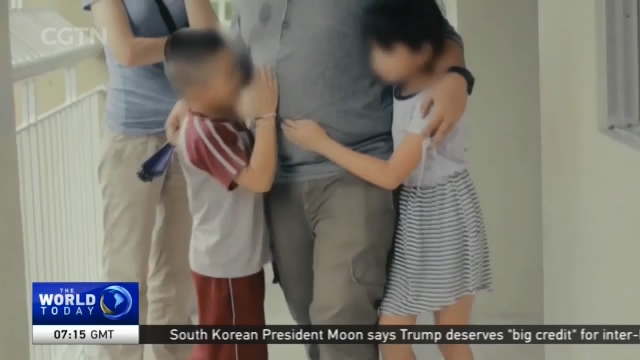
15:30, 10-Jan-2018
Stopping Traffic: Filmmaker goes on global mission to shed light on human trafficking

Child sex slavery is a harsh reality in today's world. But it's often overlooked. The documentary "Stopping Traffic" is trying to change that. CGTN's Frances Read reports on one filmmaker's efforts to heighten awareness about global human trafficking.
The documentary, "Stopping Traffic" is a film on a mission. It explores one of the largest criminal industries in the world - second only to drugs. According to the U.N., human trafficking - whether forced labor or forced sex work - is a 150 billion dollar industry. It's estimated there are tens of millions of slaves in the world today - half of them children. It was those statistics that made Sadhvi Siddhali Shree - a monk from California - want to take action. So she travelled around the world, and here in the U.S, filming what she saw.
SADHIV SIDDHALI SHREE FILMMAKER "This misconception is it doesn't happen in the U.S., and it is happening in third world countries, and we did go to third world countries - like the Philippines, and we have shots in Vietnam, Iraq. We went to Mexico and here in the United States, and California has the highest amount of trafficking cases followed by Texas and Florida. So people think it's everybody else's issue but not our own, so that's a huge misconception."
But, as she reveals in the movie, nothing could prepare her for what she found.
SADHIV SIDDHALI SHREE FILMMAKER "They chop off the kids' arms, they will make them blind by taking out their eyes - they will do whatever it takes to make money. Right now, there's 45 million victims of human trafficking."
FRANCES READ LOS ANGELES "Here in California - anti trafficking agencies say, at last count, there were around a thousand cases of human trafficking reported every year in the state, partly because it's a gateway between North America and Central America. But across the entire U.S. there are around 18-thousand people trafficked every single year."
It's people like Kay Buck who are trying to put an end to it.
KAY BUCK COALITION TO ABOLISH SLAVERY AND TRAFFICKING "It is definitely a big problem, Los Angeles, in particular, where we're located, it's considered a magnet where traffickers bring victims. But we also serve a lot of immigrant victims who think they're coming here for a great opportunity, a good job and a way to support their families and they're duped by the traffickers and enslaved for years and years right here in Los Angeles."
Shree hopes the film provides insight and continued awareness. The U.N. passed a global plan of action in 2010, and this year they're recommitting to that - with governments around the world creating new laws. But the spotlight on human trafficking awareness this month shows there's still a long way to go. Frances Read, CGTN, Los Angeles.

SITEMAP
Copyright © 2018 CGTN. Beijing ICP prepared NO.16065310-3
Copyright © 2018 CGTN. Beijing ICP prepared NO.16065310-3